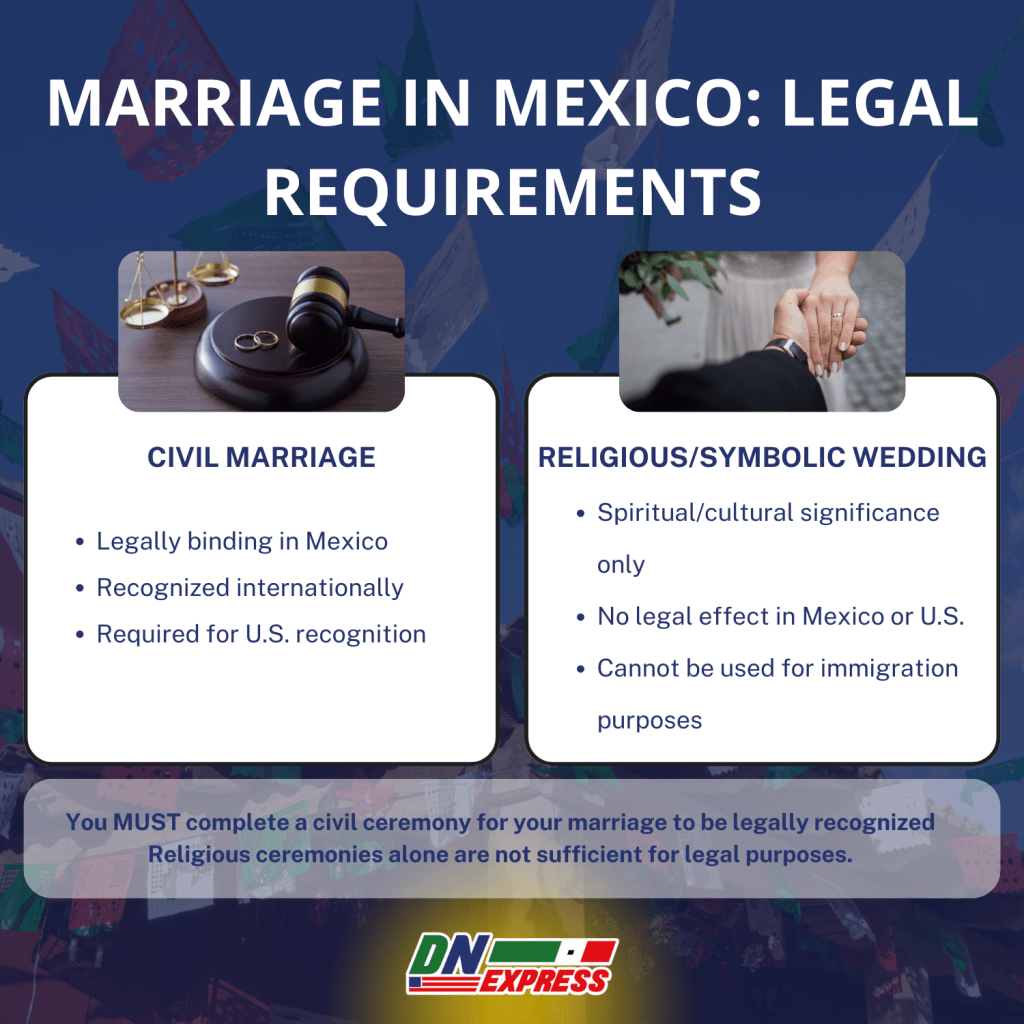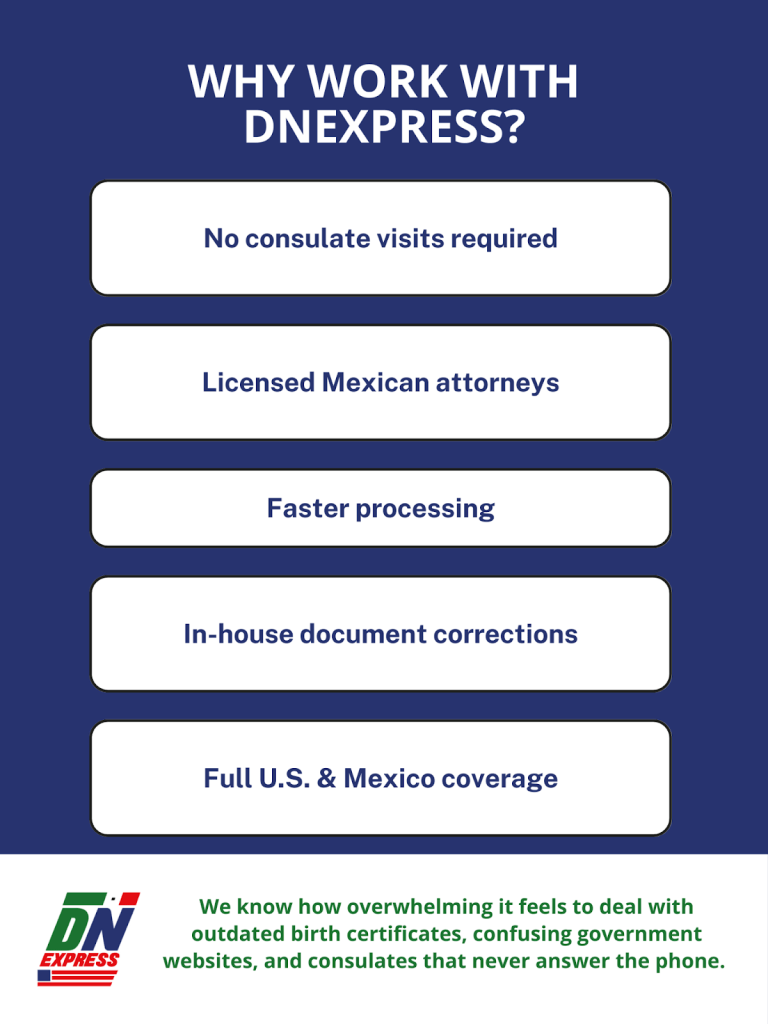
Yes, if your marriage in Mexico was performed legally at the Civil Registry, it is recognized as valid in the United States. To use it for taxes, immigration, or benefits, you'll likely need an apostille and certified English translation of your Mexican marriage certificate.
Getting married abroad can feel confusing, especially when two legal systems are involved. The good news? A marriage valid in Mexico is also valid in the U.S., but there are key details you'll need to handle, like translations, apostilles, and potential delays with benefits or name changes.
We help families navigate these exact situations, not only with marriage certificates, but also with Mexican dual citizenship, document corrections, and nationality claims. Our licensed attorneys know both U.S. and Mexican law, so you don't have to worry about small mistakes turning into big problems.
If all you wanted was the quick answer, you've got it above. But if you want the step-by-step guide, including requirements, costs, frequent misconceptions, and what to do if you've already hit roadblocks, keep reading. This article walks you through everything you need to know.
Marriage in Mexico: What You Need to Know
Before we talk about recognition in the U.S., we need to cover how marriages work under Mexican law. Many couples assume that a church wedding is enough, or that the requirements are the same everywhere, but the truth is, Mexico has its own unique rules that can affect whether your marriage is valid.
Civil vs. Religious Ceremonies
In Mexico, only civil marriages performed at the Registro Civil (Civil Registry) are legally binding. A church wedding may carry spiritual or cultural importance, but by itself it has no legal effect, neither in Mexico nor in the U.S.
To be recognized internationally, you must complete the civil ceremony.
Requirements for a Legal Marriage
According to the U.S. Embassy in Mexico, the paperwork is straightforward, but it must be done carefully:
- Passports (valid and current for both parties)
- Tourist card or residency permit (proof of legal entry or residence in Mexico)
- Birth certificates (apostilled and officially translated into Spanish)
- Blood test performed in Mexico within 15 days of the wedding (U.S. test results are not accepted)
- Four witnesses (two per spouse), each with valid government-issued photo ID
These requirements can vary slightly by Mexican state, so always confirm with the local Registro Civil.
Costs of Marriage in Mexico
The cost depends on where and how you marry. On average, civil registry fees range from $500–$4,000 pesos.
A simple in-office ceremony is on the lower end, while off-site or private ceremonies may cost significantly higher.
Waiting Periods for Divorced Individuals
If either spouse is divorced, some Mexican states require a one-year waiting period before remarrying. You'll also need to present an apostilled and translated divorce decree as proof.

Does the U.S. Recognize a Marriage in Mexico?
Here's what you need to know: yes. If your marriage was performed legally at the Registro Civil in Mexico, it is automatically recognized as valid in the United States.
You don't need to “re-register” the marriage with a U.S. courthouse.
But recognition doesn't always mean convenience. Here are some key points couples often overlook:
No Double Status
Some people ask if they can be “married in Mexico but single in the U.S.” Unfortunately, that's not possible.
Under U.S. and international law, once you're married in one country, you're married everywhere. Filing U.S. taxes as “single” after a Mexican marriage can even be considered fraud.
Apostille + Translation Are Key
For your marriage to be useful in the U.S., whether for immigration, insurance benefits, name changes, or Social Security records, you'll need to get your Mexican marriage certificate:
- Apostilled in Mexico (to verify it's authentic)
- Translated into English by a certified translator
Without these steps, many U.S. agencies will not accept your marriage documents.
Misconceptions About Registration
Some couples think they must register their marriage in the U.S. courthouse. This is not true.
U.S. law recognizes the foreign marriage itself, not whether you filed it again locally.
Immigration & Residency Benefits
If one spouse is Mexican, the marriage may also open the door for Mexican residency for the U.S. partner. On the flip side, for U.S. immigration (like sponsoring a spouse for a green card), the apostilled, translated marriage certificate is required according to USCIS policy.
Name Change Issues
While many U.S. states accept Mexican marriage certificates as proof for a legal name change, others may not. In those states, you may need to go through a court process instead, adding additional time and costs.

Frequent Worries (and Actual Answers)
Even after learning the basics, many couples still feel anxious about how their Mexican marriage will play out in the U.S. These are the most frequent worries we hear, and the truth behind them:
“What if I don't want my marriage valid in the U.S.?”
That's not possible. Under U.S. and international law, once you're legally married in Mexico, you're legally married everywhere.
The only way to end that status is through divorce.
“Will my U.S. state accept the Mexican certificate for a name change?”
It depends. Some states accept apostilled and translated Mexican marriage certificates for name changes.
Others require a separate court-ordered name change, which adds time and cost. Always check with your state's vital records office before starting the process.
“What if my documents are delayed?”
It's typical for apostilles and translations from Mexico to take weeks or even months. This can cause issues with insurance enrollment, tax filings, or name updates.
To avoid disruption, many couples marry twice, once in Mexico for tradition, once in a U.S. courthouse for speed.
“Will this slow down my spouse's visa?”
Not if handled correctly. USCIS recognizes Mexican marriages, but they require the marriage certificate to be apostilled and translated.
If those documents are missing or incorrect, the process will stall until you provide them.

Why Work with DNExpress (Doble Nacionalidad Express)
When it comes to marriages in Mexico, and the documents that follow, the process may look simple on paper but quickly becomes overwhelming in practice. That's where we come in.
DNExpress operates with a team of licensed Mexican attorneys who understand both sides of the border. Here's why families trust us:
- Licensed Mexican attorneys, every case is legally reviewed, not simply “processed.”
- No consulate visits required, we handle everything remotely, saving you time and travel.
- Specialists in fixing errors, from name mismatches to apostille delays to previously rejected applications.
- Affordable and transparent pricing, unlike traditional lawyers who charge thousands upfront.
- Proven results, with over 7,000 successful cases across California, Texas, Illinois, and beyond.
Doing It Yourself?
Handling the process alone is possible, but risky:
- Small mistakes, like missing an apostille or mistranslating a name, can derail recognition in the U.S.
- Consulates are inconsistent, with requirements and timelines that vary by location.
- Delays can cost you additional expenses in the long run, missed insurance deadlines, immigration setbacks, or court fees for corrections.
With DNExpress, you don't simply get paperwork filed. You get peace of mind knowing your documents are handled legally, securely, and correctly the first time.
Take the Next Step with DNExpress
💬 Still unsure? Don't leave your marriage or future citizenship to chance. Schedule a Free Case Review today with Doble Nacionalidad Express.
📲 Call or Message Us on WhatsApp, in a 15-minute consultation, a licensed attorney will review your situation and explain your options clearly, without pressure.
Your marriage is too valuable to risk delays, denials, or errors. Let us help you get it right the first time.

FAQ
Couples planning a wedding in Mexico often have the same doubts, not only about the ceremony itself, but about how it will affect their legal status in the U.S. Here are the most frequent questions we hear:
What happens when you get married in Mexico?
You'll receive an official Acta de Matrimonio (civil marriage certificate) from the Registro Civil. To use it in the U.S., the certificate must be apostilled in Mexico and translated into English by a certified translator.
Do I need to register it in the U.S.?
No. Recognition is automatic.
Once it's legal in Mexico, it's legal in the U.S. However, agencies like the DMV, Social Security Administration, USCIS, and IRS may require an apostilled and translated copy before updating your records.
How do I legalize my marriage certificate in the U.S.?
You don't legalize it in the U.S. Instead, you legalize it in Mexico by requesting an apostille from the Hague Convention.
Only then can it be officially recognized by U.S. institutions.
Is it illegal to be married in two countries?
Yes. If you marry in Mexico and then marry again in the U.S. without divorce, that's bigamy, a criminal offense.
Legally, “married is married”, the union follows you everywhere.
Why do I need a blood test to marry in Mexico?
It's a Mexican legal requirement, meant to ensure transparency about health conditions. The test must be done within Mexico; U.S. test results won't be accepted.
How much does it cost to marry in Mexico?
Registry fees range from $500–$4,000 pesos, depending on the state and whether the ceremony is in-office or private. On top of that, apostilles and translations in the U.S. usually cost $150–$500 USD.
Can I divorce in the U.S. if I married in Mexico?
Yes. U.S. courts can grant divorces for marriages performed abroad.
Generally, a divorce in one country is recognized in the other, though you may need certified translations of your marriage documents.
Is it worth getting legally married in Mexico?
It depends on your goals. Many couples choose a symbolic wedding in Mexico (for family or tradition) but handle the legal paperwork at a U.S. courthouse.
Others prefer the legal Mexican marriage for immigration benefits or dual citizenship purposes through DNExpress services.



